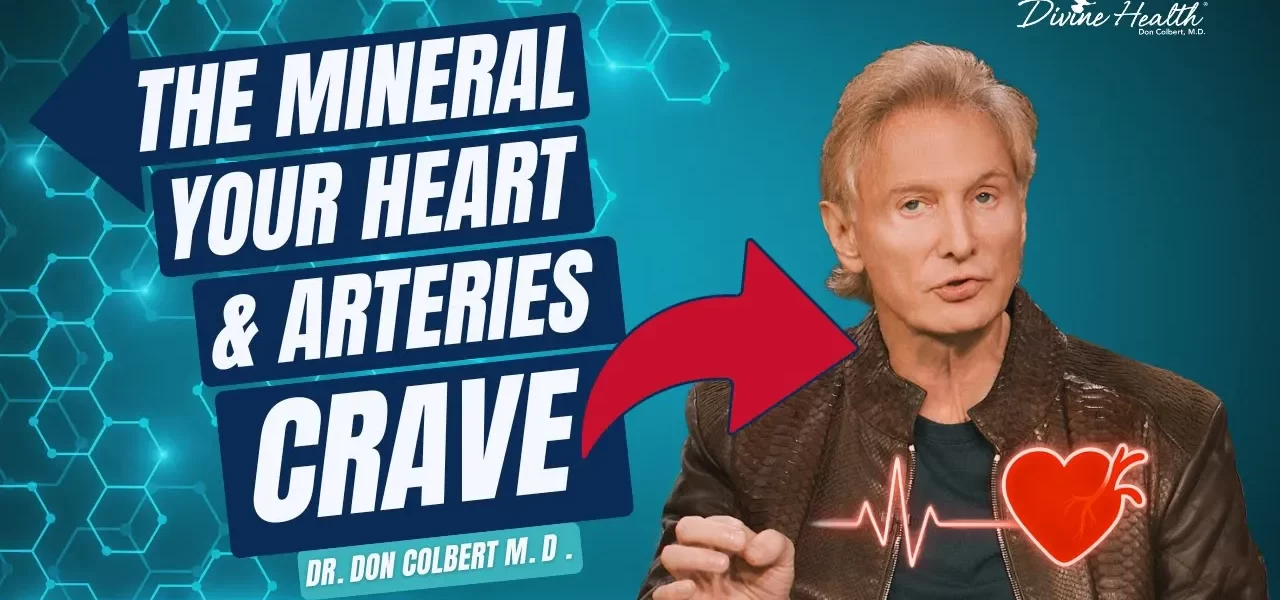Magnesium Deficiency: Lower Blood Pressure, Stop Reflux & Protect Your Arteries (K2 Guide) Ep. 2
Episode #2: Magnesium Deficiency, K2, Bones & Blood Pressure — Live Long & Strong
Kyle, Mary, and Dr. Don Colbert unpack the real-world signs of magnesium deficiency (from reflux to blood pressure),
why the U.S. diet skews calcium-heavy, and how Vitamin K2, smart forms of magnesium, and lifestyle tweaks protect your heart, brain, and bones.
They also cover practical fixes for reflux (DGL, mastic gum, ginger tea), circulation, sleep, migraines, insulin resistance, and bone strength.
Shop Chelated Magnesium in Multivitamin
Shop Super K2 (MK-7)
Shop Nano-Glutathione
Explore Bone Support (Silicon 1 / Silicol 2)
Explore All Supplements
🔑 What You’ll Learn
- Why ~60% of Americans miss the RDA for magnesium and how stress, caffeine, sugar, and ultra-processed foods deplete it.
- How low magnesium ties to reflux (LES dysfunction), blood pressure, arrhythmias/PVCs, migraines, cramps, and sleep issues.
- The calcium overload problem (cheese/antacids) and why aiming for ~1:1 calcium:magnesium plus Vitamin K2 matters.
- How magnesium supports insulin sensitivity, cholesterol balance (HMG-CoA reductase), brain ATP/energy, and circulation.
- Bone strategy: calcium + magnesium + D3 + K2 (+ silicon/boron/strength training) for resilient bones.
📏 Daily Targets (Intake)
- Men: ~420 mg/day
- Women: ~310–320 mg/day
- Teens (9–19): ~350–410 mg/day
- Children: ~150–240 mg/day
Optimal lab marker: RBC magnesium around 6.0–6.5 mg/dL is cited in the episode as a target to discuss with your clinician.
🥑 Top Food Sources (Approx. per serving)
- Pumpkin seeds (~1 oz): ~168 mg
- Cashews (~1 oz): ~83 mg
- Dark chocolate (≥70%, 1 oz): ~64 mg (milk chocolate is low)
- Avocado (1 whole): ~58 mg
- Black beans (1 cup): ~120 mg
- Cooked leafy greens (1 cup): up to ~150 mg
- Note: Ultra-processed foods, excess sugar/caffeine, and chronic stress lower magnesium status.
🚩 Signs You Might Be Low
- Reflux/heartburn, cramps/spasms, eye twitches
- High blood pressure, palpitations/PVCs, poor circulation (cold/burning feet)
- Low energy, anxiety, poor sleep, stress-triggered migraines
- Insulin resistance, stubborn belly fat, elevated cholesterol
🧠 Magnesium, Calcium & K2: The Balance
- Aim for ~1:1 calcium:magnesium intake (typical U.S. pattern can be 10:1 or worse).
- Cheese can run ~25:1 Ca:Mg; common antacids can exceed 100:1.
- Vitamin K2 directs calcium into bones/teeth and away from arteries—pair with Mg + D3.
💊 Choosing the Right Form
- Glycinate — calming; sleep, stress, and migraine support.
- Malate — energy/fatigue support.
- Citrate — supports regularity (may loosen stools).
- Taurate — often chosen for heart/muscle support.
- Ionic/topical — quick uptake (ionic in water; lotions for night cramps).
- Chelated blends — broad coverage for daily use.
✅ Quick Action Plan
- Shift toward a whole-food Mediterranean or Keto Zone pattern; cut refined sugar and ultra-processed foods.
- Add magnesium daily (form matched to goal); titrate to comfort and labs.
- Pair with Vitamin K2 + D3; keep Ca:Mg near ~1:1.
- Reflux protocol: elevate head of bed, reduce belly fat, try DGL, mastic gum, ginger tea, and magnesium; consider baking soda as needed.
- Discuss an RBC magnesium test; re-check in 8–12 weeks and adjust.
- Bone stack: Ca + Mg + D3 + K2 (+ silicon/boron) + strength training.
- Brain/artery hygiene: Mg + K2 + Nano-Glutathione support flow, redox, and cleanup.
⚠️ Safety Notes
- If you have kidney disease or take PPIs/diuretics/psych meds, consult your clinician before supplementing.
- Magnesium citrate may loosen stools; adjust form and dose.
- Do not discontinue prescribed heart or blood-pressure medicines without medical guidance.
✝ Faith & Health
Steward your body with wisdom. Daily choices—nutrient-dense foods, movement, rest, and targeted supplementation—compound into strength for the long race.
📚 Helpful Links
Shop Chelated Magnesium
Shop Super K2
Nano-Glutathione (Search)
Silicon 1 / Silicol 2 (Search)
Explore All Supplements
Medical disclaimer: Educational content only. Not a substitute for personalized medical advice. Consult your healthcare professional before making changes to medications or supplements.
Show Transcript
…

















